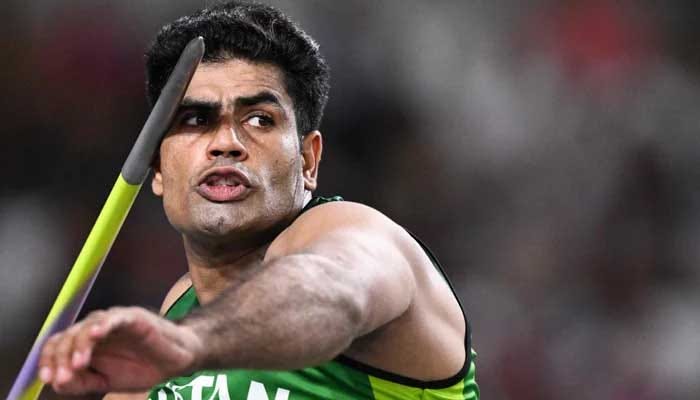Arshad Nadeem’s Rare Triumph in Olympics
Pakistan Now Has an Opportunity to Address Structural Issues

Arshad Nadeem’s record breaking javelin throw in Paris won Pakistan its first Olympics medal in over three decades, and first individual gold medal. Pakistanis were jubilant in praising Nadeem, however, Nadeem’s rare triumph exposes rather than vindicates the policy orientations of Pakistan’s ruling elite, which tried to take credit for the victory.
Nadeem himself defied all odds. It was reported that Nadeem was unable to get even a proper javelin to practice months prior to the Olympics, a sport for which athletes in most other countries practice for years. A father of two, Nadeem was forced to work while finding time to practice so that he could realize his dreams.
Nadeem, his brothers, and his coach Salman Butt struggled to get even the bare minimum training equipment. Due to the lack of sports arenas, Nadeem had to use the fields of his village and use an improvised javelin during practice sessions, even after becoming a recognized name who had already represented Pakistan at several international events including the Tokyo Olympics in 2020.
Nadeem had finished fifth in the Tokyo Olympics, and had won a gold medal in the 2022 Commonwealth games and a silver at last year’s world athletic championship, and yet it was only after repeated appeals he was finally provided with a proper javelin at the last minute before the Paris games, Nadeem’s mother Razia Parveen told Reuters.
Nadeem had tough competition from India’s Neeraj Chopra who had won gold in the last Olympics in Tokyo in 2020 and had a relatively better training atmosphere. Therefore, throwing his javelin at a record breaking length of 92.97m on 8 August and winning gold was nothing short of heroic.
Nadeem’s family grew up in a mud brick house of Mian Channu in Khanewal, Punjab, with inadequate electricity and water supply, much like many living in Pakistan. The working classes in the country celebrated his triumph as their own.
Congratulations to Arshad Nadeem for setting a new record and bringing home gold from the Paris Olympics. We are proud of you ✊ pic.twitter.com/9B7WATt06y
— Haqooq-e-Khalq Party (@Haqooq_e_Khalq) August 9, 2024
The gestures of Nadeem and Chopra’s mothers on either side of the border between India and Pakistan also created a lot of buzz. Both countries are at historic lows in terms of diplomatic relations, with hatred pushed by the right-wing dominating the discourse. It was refreshing and a show of defiance to the usual malice when Chopra and Nadeem were seen bonding in Paris after their match, and Chopra calling Nadeem “like my son.”
Structural constraints on Pakistani sports
On the one hand, Nadeem’s victory in the circumstances described above shows his resilience and determination, on the other, it also exposes the failures of Pakistan’s ruling classes who have since tried to take credit for Nadeem’s success.
Pakistani authorities not only failed to provide basic facilities and training to its champion athlete but they have been largely responsible for the country’s overall dismal records at all international sports events.
According to Ammar Ali Jan, head of the Haqooq-e-Khalq (HKP) Party, “Arshad Nadeem is demonstrating the power of an incredible athlete to bring together a broken nation. He has achieved this with negligible support from our system.”
The fact that Pakistan could send only seven athletes in this years’ Olympics despite being the world’s fifth largest country in terms of population, with over 250 million people, points to a problem larger than mere lack of expenditure on sports or failure to sponsor Nadeem at the right moment. Cuba, a country of just over 11 million people, sent 61 athletes to the Paris Olympics.
It’s a matter of priorities. Most Pakistanis do not get safe drinking water and electricity even now. They are often subjected to lack of educational institutions and basic health amenities. The soaring prices of electricity and food items, a result of economic mismanagement and IMF-dictated policies have further deteriorated living standards for the people of Pakistan.
It is telling to see Nadeem making fervent appeals to his government after returning home from Paris, pressing for educational institutions and electricity facilities for the people in his town. Going along with the euphoria, the government even announced provision of electricity to Nadeem’s hometown. Various governments announced over 150 million Pakistani rupee as rewards to Nadeem as well.
This is a classic populist approach. The state’s lack of investments in the larger social well being will always be a handicap. Societies such as Pakistan, which stands at 164 out of 193 countries in the UNDP annual Human Development Index in 2024, will always have a structural limitation on their talent pools making performances like Nadeem’s a rarity. Instead there is a need to take a systemic approach, as indicated by some commentators, and learn from countries like China in order to invest heavily in Pakistani society and culture.



